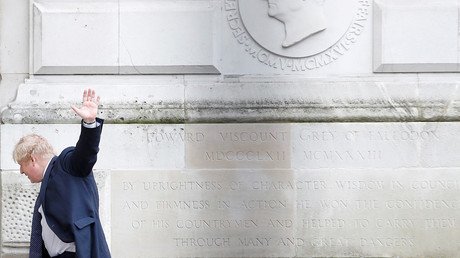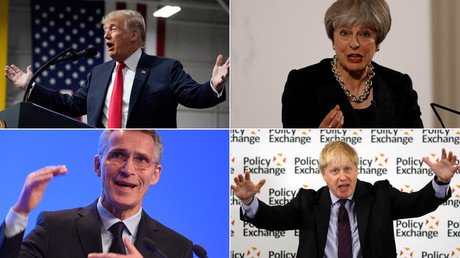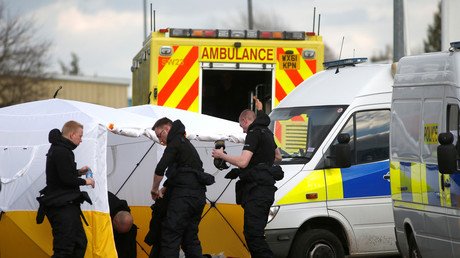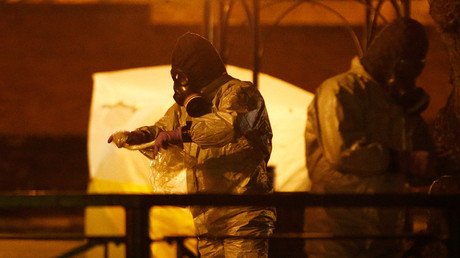Accusations and threats, but where are the facts? – Russia challenges West on truth
From the MH17 case to chemical attacks in Syria to the Skripal poisoning, the West only throws accusations against Russia without giving any proof, the Russian Foreign Ministry said, adding that such an approach “will not work.”
The Western countries have never presented proper evidence to substantiate their claims in any of the recent high-profile international incidents, including the downing of the Malaysia Airlines jet over Eastern Ukraine or the alleged instances of the use of chemical weapons in Syria. They, however, always treated their own statements as “ultimate truth,” the Director of the Russian Foreign Ministry’s Department for Nonproliferation & Arms Control, Vladimir Ermakov, said at a meeting with the representatives of foreign embassies in Moscow.
His words come in response to yet more accusations and threats issued by western countries in relation to the poisoning of the former Russian double-agent, Sergei Skripal, and his daughter. Although the ambassadors from the UK, France and the US did not bother to attend the meeting with the Russian Foreign Ministry’s officials over the Skripal case, they sent their representatives with harshly worded statements. A US representative warned that Washington “will hold Russia accountable for its illegal actions,” reiterating that the US stands in complete solidarity with UK.
His French colleague also expressed the “full solidarity of France with the UK,” following what he called a “chemical attack that was conducted on its territory.” The diplomat also asked if Russia would “trust” the outcome of an investigation conducted jointly by the British experts and the representatives of the Organization for the Prohibition of Chemical Weapons (OPCW).
“The OPCW convention and the OPCW itself do not provide opportunities to give assessment to what exactly happened in Salisbury,” the Russian diplomat responded, adding that “a deeper, expert assessment would be needed anyway, for Russia to be able to come to any conclusions.”
‘Real facts’ and ‘Ultimate truth investigations’
Ermakov said that the credibility of the OPCW investigations, conducted in close cooperation with the West only, has been severely undermined by the international probe conducted in Syria.
“We know how some mechanisms that you consider to be ‘reliable’ worked in Syria: it was a total fake,” he added, referring to the Joint Investigative Mechanism (JIM) of the Organization for the Prohibition of Chemical Weapons (OPCW), which was tasked with investigating the instances of the alleged chemical weapons used in Syria. Russia has repeatedly criticized the JIM for failing to produce objective reports on chemical attacks, including the April 2017 incident in the village Khan Shaykhun. It also slammed the probe for relying on cherry-picked facts and accounts by partisan sources.
'As for ‘Novichok,’ there was never a scientific program under such a codename in the Russian Federation' https://t.co/IL1l4kxrAE
— RT (@RT_com) March 17, 2018
After the JIM mandate had expired in November 2017, Moscow proposed to establish an objective investigative mechanism to probe all allegations of chemical attacks in Syria “based on impeccable and irrefutable data.” The proposal was, however, immediately dismissed by Washington.
READ MORE: US rejects Moscow-proposed UN mechanism to probe Syria chemical attacks based on facts
Those who want to “investigate something without presenting the real facts and then declare the results of such an investigation as the ultimate truth,” apparently have some “malign intentions,” Ermakov said. He then added that such schemes “would not work in the case of Russia.”
OPCW: No member states known to possess ‘Novichok-class’ nerve agents https://t.co/2oXArz5vGz
— RT (@RT_com) March 16, 2018
“Do you want to investigate [the Skripal case]? We are ready for a joint investigation. If you do not, then it is a different question entirely,” the Director of the Department for Nonproliferation & Arms Control said. He also pointed out that CCTV cameras are mounted almost “everywhere” in the UK and the British authorities must have had records showing what exactly happened in Salisbury.
“You have everything recorded. Share [the evidence] and we will help with the investigation,” the diplomat added. He then drew attention to the fact that it is not the first time that the western powers have refused to disclose evidence that could be crucial for a high-profile international investigation but could prove undesirable for the agenda promoted by the West.
MH17 shadow: Accusations against Moscow repeated, but hard evidence still missing https://t.co/sY7cDzhoI2pic.twitter.com/aYDpaS7hGc
— RT (@RT_com) March 14, 2018
“Does the US really have no … data about who exactly shot down that Boeing?” Ermakov rhetorically asked, referring to the downing of Malaysia Airlines Flight MH17 in 2014. “You did have everything recorded, you had a satellite [monitoring the situation] over there,” he added, responding to the comments of the US diplomat during the meeting.
He then said that the US preferred to “stay silent” and never shared its data following the incident despite the fact that the investigation into the attack on the jet became de facto deadlocked. The diplomat also drew attention to that fact that the West “blamed Russia even before the Boeing hit the ground.”
Six months after the inquiry into the Flight MH17 crash in Ukraine had entered its fourth year, the Dutch investigators have not provided any tangible results. The probe has been recently extended for yet another year. The Western politicians, meanwhile, continue to blame Russia for the incident.
MH17 shadow: Accusations against Moscow repeated, but hard evidence still missing
In the meantime, Ermakov said that repeated accusations issued against Russia show the West’s attempts to hide from the current international reality. Instead, one should think about “how to build new international relations … in a world that has come a long way [from the] unipolarity … of the 1990s, when almost everything was being decided in Washington,” he said.
“These times have passed away. We need to develop international relations, which would be based on the current reality,” he added.
Think your friends would be interested? Share this story!

















